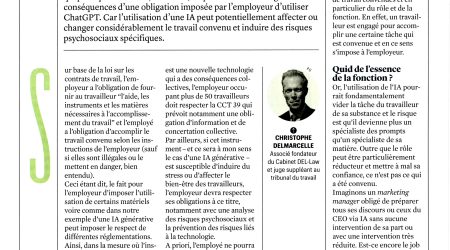In the case of Fornieri, can an indictment justify breaking off the relationship?
Posted the 27 June 2021As part of the ‘Nethys’ judicial wave, François Fornieri, current CEO of the listed pharmaceutical company Mithra, was charged on Friday and placed under arrest. The charges relate in particular to misuse of corporate assets...
As part of the judicial wave surrounding “Nethys,” Mr. François Fornieri, the current CEO of the publicly traded pharmaceutical company Mithra, was charged this Friday and placed under arrest.
The charges reportedly include misuse of company assets and embezzlement allegedly committed during his tenure as a board member and chair of the remuneration committee at Nethys.
This raises the question of whether such charges can justify severing ties with Mithra, given that the alleged acts are unrelated to the company and that Mr. Fornieri remains innocent until proven guilty.
If Mr. Fornieri were employed under an employment contract with Mithra—which is presumably not the case—the first effect of preventive detention would be the automatic suspension of the employment contract, as explicitly provided by the law of July 3, 1978, on employment contracts (Article 28, 5°).
Regarding termination, preventive detention cannot be equated to force majeure since it is not permanent. Termination without compensation on the grounds of force majeure would only be possible in the case of a definitive conviction involving imprisonment, which would, de facto, make it impossible to continue the employment contract.
However, consistent case law establishes that private matters or actions unrelated to the employment relationship can justify dismissal for serious cause when they amount to misconduct so severe that it undermines the employer’s trust. The alleged acts in Mr. Fornieri’s case could clearly constitute such grounds for serious cause, even though they are unrelated to Mithra.
In the context of criminal proceedings, the key question is when to terminate the contract, as the law of July 3, 1978, requires action within three days of the misconduct (or becoming aware of it). In some cases, the facts will be so evident at the time of indictment that termination can occur without waiting for the end of the criminal proceedings. In others, it may be necessary to wait until conviction, or even until all appeals are exhausted, making the decision complex.
According to available information, Mr. Fornieri operates as Mithra's CEO through a management company (Yima SPRL), a fairly standard structure for tax purposes. This management company—of which Mr. Fornieri is the manager and permanent representative—was appointed as the director responsible for daily management, i.e., the CEO. There is some confusion here, as the company's website omits any mention of this arrangement.
In this case, the question of termination will depend entirely on the wording of the service contract, particularly the clauses on termination for serious cause, and the governance policies adopted by the company. Publicly traded companies are required to implement a governance code.
In Mithra’s case, the governance code available online includes a succession plan stating that in the event of the CEO’s “unavailability” for less than six months, the CFO assumes the CEO’s duties. In this case, no board decision is necessary except to formally note the transition into “succession mode.” However, if the unavailability exceeds six months, the board of directors may decide, if it deems the situation a risk to the company, to revoke the CEO. Subject to the terms of the agreement between Mithra and Yima SPRL, the decision on Mr. Fornieri’s position would thus arise only after six months of absence.
This likely explains why, at this stage, only an interim CEO has been appointed, despite the apparent gravity of the charges—bearing in mind the presumption of innocence—and while Mithra, according to its governance and ethics codes, claims to apply “a zero-tolerance approach to corruption and bribery in all forms.”
Related articles

Is an employer allowed to mandate the use of artificial intelligence tools by employees ? (Trends, 17-07-2025)

Caution if a former colleague opposed to your employer asks you to testify in their favor
